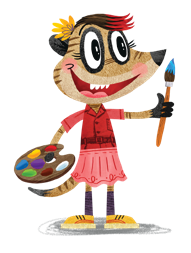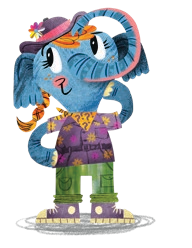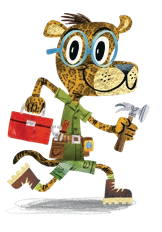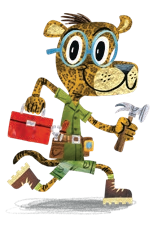Numbers
1:1
The Israelites stayed in the Sinai Desert for two years. There God gave his laws to Moses. These laws are recorded in the book of Leviticus. Moses taught the laws to the people. Then the Israelites packed up their camp. They continued their journey to the land God promised them.
1:20–46
While they were in the Sinai Desert, Moses and Aaron counted all the men of Israel. There were 603,550 men who were 20 years old or more. There was a reason that only men were counted. They needed to know how many men would be able to fight if the Israelites were attacked.
3:6
The descendants of Levi were called the Levites. They were appointed to serve the Lord in the holy tent. The descendants of Aaron were priests. They brought the daily offerings to the Lord. When the people travelled, the Levites had to pack up the holy tent. It was their job to carry it. Then they set it up at their new resting place. Each family of Levites was responsible for a different part of the holy tent.
6:2
Sometimes certain people chose to be set apart to serve God in a very special way. They were called Nazirites. The word Nazirite comes from the Hebrew word nazir. It means set apart. To show that they were set apart, they didn’t drink wine. And they didn’t use vinegar which was made from wine or grape juice. They didn’t eat grapes, raisins or the seeds and skin of grapes either. They also didn’t cut their hair. Samson was a Nazirite.
7:84–88
In the Bible, a number was often used as a symbol for something else. And as a symbol, it would also have a special meaning. For example, the number 12 means fullness or completeness. It’s also a symbol of God’s power and authority. The number 12 represents the completeness of God’s creation. There were 12 tribes in Israel. And Jesus had 12 disciples. The number 12 was also important when offerings were made. It showed that the offering was correct in every way.
9:15–18
The cloud that covered the holy tent reminded the Israelites that God was with them. The cloud was the sign of God’s presence among them. The cloud showed the people when it was time to move. It also showed them where they had to move to. The people followed the cloud. When the cloud stopped moving, they would set up camp again.
13:17–30, 14:6–9
Moses sent out 12 men, one from each tribe. He sent them to check out the land God had promised them. Arty would like you to draw a picture. In the picture, show what they saw in the land God promised them. Then draw a picture showing what they brought back with them. What did ten of the men say about the land? Make sure you include this in your picture.
- What did Caleb say? (Read Numbers 13:30.)
- What did Joshua say? (Read Numbers 14:6–9.)
Caleb and Joshua were ready to obey the Lord and follow him. The ten other men weren’t. Whose advice should the Israelites have followed?
14:10–12, 19–24 (Thinky)
Thinky read about the Lord becoming angry. He wanted to destroy the people. Then Moses reminded the Lord of his love for his people. Moses asked the Lord to forgive them. The Lord forgave the Israelites. But he said that none of them would see the land God promised them. They had to go back to wandering in the desert.
Sometimes we may think God isn’t fair. But we know God’s ways are always just and right.
Was God merciful to the Israelites? What could he have done? What did he do?
20:7–12 (Talky)
Talky thinks it will be interesting to role-play a television interview about this miracle. Get two or three friends together and read the verses. One person is the TV reporter. The others are the people being interviewed. The reporter asks each person what they saw.
How did they feel about what happened? What did it teach them about God? End the interview by reviewing together what this event taught you about God.
The Lord wanted Moses to talk to the rock. But he hit the rock with his walking stick instead. The Lord did a miracle and water poured from the rock. But because Moses had been disobedient, the Lord punished him. He wasn’t allowed to enter the land God had promised them.
The Lord asks us to be totally obedient. We can’t choose when and how we will be obedient.
21:4–9 (Make Crafty’s spiral snake)
Find a stiff paper. Draw a snake’s head in the middle of the paper. Draw a spiral starting from the head of the snake and going out to the edges of the paper. Make the lines about ½ inch apart. Write the words of John 3:16 inside the spiral.
Cut along the line of the spiral. Thread a piece of string through the head of the snake and hang it up. The spiral will form the body of the snake.
In John 3:14–15, we can read how Jesus talked to Nicodemus about Moses’ bronze snake. Moses had to put the snake on a pole. Jesus was also put on a pole, which was the cross. People who believed in God and looked at the snake were healed. They remained alive. Jesus died on the cross to save us. When we look to him and believe, he will forgive our sins. We become God’s children. And we will live forever with him in heaven.
22:18–30
Balaam was a prophet who did evil magic. He was a very stubborn man. He also disobeyed God. So the Lord made Balaam’s donkey speak to him. When this happened, Balaam learned to obey the Lord.
22:22–35
Make puppets to help you tell the story of Balaam and his donkey. Crafty says you can make paper bag puppets, sock puppets or finger puppets. Put on a puppet show to tell the story to the smaller children at your church. Or you could tell your younger brothers and sisters. Remember to practice first!
23:11–12
Balaam had messages from God for several other nations. God gave the messages to him. Then Balaam had to tell the people what God had told him. This is what a prophet has to do. Sometimes he brings a message of blessing, here or another time he brings a message of warning. Balak, the king of Moab wanted Balaam to curse the Israelites. Instead the Lord gave Balaam a message of blessing for them.
24:1
Balaam was a prophet who only said what the Lord wanted him to say. That is why he gave Balak a message of blessing and not cursing.
26:1–3
The Israelites wandered in the desert for 40 years. Everyone who had been to the land God promised the first time died in the desert. These people didn’t see the land God promised again. Only Caleb and Joshua would see that land again and entered it.
When the Israelites reached the land God promised the second time, the men were counted. Moses and Aaron needed to know how many men they could send into battle. They had to be prepared to fight against the other nations in Canaan. Today all the people of a country are counted when a census is taken.
32:1–6, 16–18
Some tribes chose to stay on the east side of the Jordan River. These were Reuben, Gad and half of the tribe of Manasseh. They liked this area as there was good pasture for their herds. Abraham used it, but he asked them first to help the other Israelite tribes conquer the land. The other Israelites wanted to cross the Jordan River. They wanted to find a place to live in Canaan. The three tribes promised Moses they would go ahead of the other Israelites and fight. They wouldn’t go back to their homes until Canaan was conquered.






